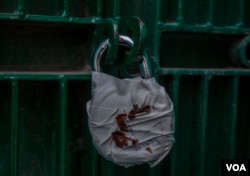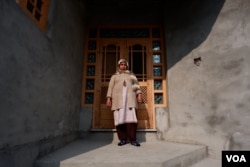Authorities in India-administered Kashmir have seized more than a score of homes associated with the banned Islamist movement Jamaat-i-Islami in recent weeks, raising tensions in the long-troubled Muslim majority region.
The latest wave of confiscations came Saturday when at least 20 properties were seized on the recommendation of the State Investigative Agency, according to multiple reports. Dozens more properties are reported to have been targeted for confiscation.
In one of the more dramatic actions, Indian forces were placed on alert for the seizure on Dec. 20 of a two-story house in an upscale Srinigar neighborhood that once was the home of Syed Ali Geelani, a prominent separatist leader who died last year.
The raid was conducted by India’s top terror-probing organization, the National Investigation Agency (NIA), in the presence of local police.
A Geelani family member, who spoke to VOA on condition of anonymity for fear of official retaliation, was vague when asked who currently owns the house.
“Perhaps, the property belonged to Jamaat-e-Islami, now a banned organization. We lived there for a short while,” the family member said.
India banned Jamaat-e-Islami, or JeI, for five years under anti-terror laws In March 2019. The organization, founded as an Islamic reformist movement in 1941, was accused of being in “close touch with anti-India militant outfits” and of working to “escalate secessionist movement” in the Kashmir Valley.
JeI refuted the allegations, saying it was a socio-political and religious organization with no connection to the militancy that has troubled Kashmir for decades.
The NIA has been staging raids under the increased authority it received when the Indian government revoked Kashmir’s limited autonomy in 2019. Since then, the agency has conducted raids across the valley in a bid to crush separatist militants who have remained a factor in the region despite the presence of multiple Indian secret-service agencies.
Several of the latest property seizures were conducted by a newly constituted local police force called the State Investigative Agency.
On December 18, SIA said JeI properties worth 1 billion rupees [$12.1 million] were seized in several districts of the valley. The agency also said it has identified 188 properties belonging to Jamaat-e-Islami that either have been “notified or are under the process of being notified for further legal action.”
VOA approached multiple JeI members for comment but all refused to speak, fearing reprisals.
Vijay Kumar, whose title is additional director general of Police Kashmir [ADGP], was quoted by an Indian TV channel WION saying the police will “seize all the properties of the people wherever there is an encounter or is being used as a hideout or are harboring the terrorists, their property will be seized.”
Kumar added that if there is a “forceful entry of terrorists” into any house or other structure, the house owner or any other member claiming duress should promptly inform authorities, adding that there are provisions available for hiding the identity of such informants.
A legal expert, who asked that his real name not to be used for security reasons, said that seizure of any property by the state should occur only after a court has determined that the property belongs to an unlawful organization.
“Government should follow the procedures which are already established under law instead of acting arbitrarily,” the expert said.
Among those whose homes have been seized is Naseema Begum, 55. Seated alone inside the kitchen of the house where she is now staying, Begum said her family was accused of harboring militants who were killed during a firefight in Srinigar in September 2020.
“Police said a militant was killed in a lane adjacent to our house and the remaining two inside our lawn,” Begum said. “They don’t believe us that militants may have sneaked into our premises from a neighboring colony after police conducted searches.”
She added that her family had left the home after police knocked at their door during the midnight raid.
“None of my family members has affiliation with militants,” Begum said. “Can anyone say no to gunmen?” she asked.
Begum also decried the jailing of her three sons on charges of being “militant sympathizers,” which she said stemmed from a visit to Pakistan by her youngest son.
“He visited there so that my younger daughter could get enrolled in any of the medical colleges of that country,” Begum said.
The property seizures have prompted objections not only from critics of Indian rule in Kashmir but also from people associated with the New Delhi-backed state administration. Among those is Mehbooba Mufti — a former chief minister of Kashmir and the current chairperson of the Peoples Democratic Party — who termed the move “collective punishment on the people of Kashmir.”
“I see it as vengeance following the undemocratic move on 5 August 2019,” she said in reference to the revocation of autonomy for Kashmir. “Tomorrow if they find out someone’s grandfather was a member of JeI, will they seize that property as well? Today it is happening with someone and tomorrow it can happen with anyone.”







